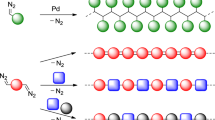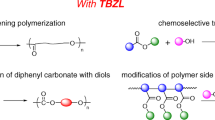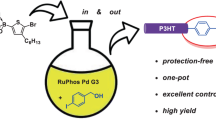Abstract
AFTER earlier investigations1 had shown the practicability of self-condensing ferrocenyl carbinols to give polymers containing ferrocenylene units interconnected by methylene or methine bridges, it was of interest to investigate the direct condensation of ferrocene with aldehydes. These components, if used in proper molar ratios, should interact according to equation 1:  with ferrocenyl carbinols and corresponding metallo-carbonium ions expected to occur as intermediates, and the resulting polymers should possess structure I:
with ferrocenyl carbinols and corresponding metallo-carbonium ions expected to occur as intermediates, and the resulting polymers should possess structure I: 
This is a preview of subscription content, access via your institution
Access options
Subscribe to this journal
Receive 51 print issues and online access
$199.00 per year
only $3.90 per issue
Buy this article
- Purchase on Springer Link
- Instant access to full article PDF
Prices may be subject to local taxes which are calculated during checkout
Similar content being viewed by others
References
Neuse, E. W., and Trifan, D. S., J. Amer. Chem. Soc., 85, 1952 (1963).
Neuse, E. W., and Trifan, D. S., Abstr. Papers presented at the 148th Nat. Meeting, Amer. Chem. Soc., Chicago, Ill., 5S (September 1964).
Author information
Authors and Affiliations
Rights and permissions
About this article
Cite this article
NEUSE, E. Ferrocene-containing Polymers : Polycondensation of Ferrocene with Aldehydes. Nature 204, 179–180 (1964). https://doi.org/10.1038/204179a0
Issue Date:
DOI: https://doi.org/10.1038/204179a0
This article is cited by
-
Condensation reactions of formyl- and acetyl-ferrocene
Experientia (1965)
Comments
By submitting a comment you agree to abide by our Terms and Community Guidelines. If you find something abusive or that does not comply with our terms or guidelines please flag it as inappropriate.



